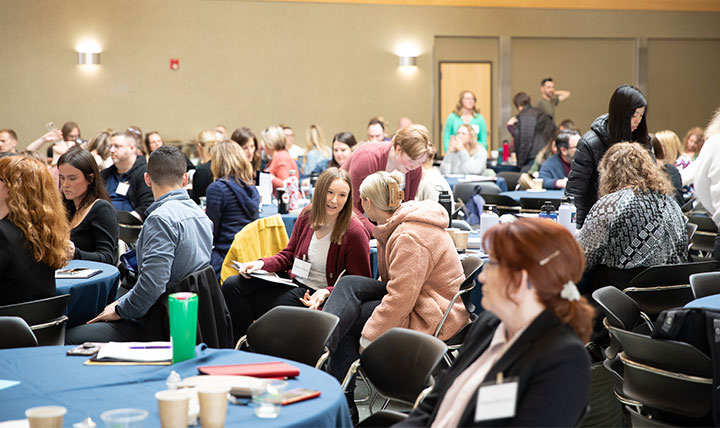School of Education’s Assessment Conference Focuses on Cognition

More than 100 school psychologists gathered at Gonzaga University for the annual assessment conference this spring – the second and largest in-person meeting since the pandemic – to explore “The Future of Cognitive Assessment.” Three experts shared the latest research and evidence that suggests school psychologists and other professionals involved in assessment should carefully consider all measurements of abilities, rather than relying on a single IQ score to determine developmental disabilities and the appropriate intervention strategies.
Kevin S. McGrew, PhD, educational psychologist and director of the Institute for Applicated Psychometrics provided the keynote address. He is also an adjunct research professor at the Institute on Community Integration at the University of Minnesota. LaTasha R. Holden, PhD, assistant professor of psychology at the University of Illinois at Urban-Champaign and Peng Peng, PhD, assistant professor in special education at the University of Texas also presented recent research findings.
“All three speakers approached the work from different considerations,” said Miriam Carlson, a GU graduate student in school psychology, “and they presented a fascinating and consistent message.”
While current intelligence tests measure a hierarchy of abilities – with broad factors all reflected in one score – speakers suggested that subprocesses may offer the best opportunities for intervention. Broad abilities include comprehension-knowledge (or crystallized intelligence), fluid reasoning, visual processing, working memory, processing speed, auditory processing, learning efficiency and retrieval fluency.
“Everything is a web – it’s interconnected,” said Carlson, “and school-based professionals may be able to assist students more effectively if we pay more attention to subprocesses. There are tools to measure these subprocesses – and understanding what they mean can direct us closer to what will actually make a difference to the student.”
Holden encouraged school psychologists and others to understand who the tests were designed for and whether they work effectively for students coming from various racial, ethnic or socioeconomic backgrounds. Applying a social justice lens and recognizing the impact a student’s anxiety may have on test performance are key to understanding the data, she shared.
“We need to know if the measures we’re getting are real – anxiety or ability needs to be distinguished,” Carlson said. Mindfulness practices may be particularly helpful for these students.
“Dr. McGrew challenged us to look at the complexity of intelligence testing and to develop nuanced interventions, rather than relying on one score,” said Ridge Bynum, a GU graduate student in school psychology. “This underscores the need to conduct more research on both an individual level, and collaboratively as school psychologists working together to recognize and tackle the research-to-practice gap.”
Participants were also encouraged to remember that abilities can change, skills can grow, and a strengths-based approach can impact students with special needs significantly. As a result, strong, ongoing communication with families and classroom teachers is essential to ensure that all students receive the help they need.
Peng Peng, whose research focuses on the role of executive function in reading development and reading intervention, outlined studies that explore the relationship of working memory, attention control, and training tasks which can be used to gauge a variety of academic skills. His research also encourages sensitivity to background and the home environment of individual students.
Both GU graduate students agreed – this is an exceptional time to be entering the profession of school psychology, with strong research to pursue and dedicated professionals committed to serving.
Gonzaga University awarded the Alan S. Kaufman Excellence in Assessment Award to McGrew in recognition of his exceptional contributions to the field and his lifelong commitment to school psychology, the science of human abilities, and helping students with special needs to name a few.
The spring 2023 assessment conference, the sixth presented by GU’s School of Education’s School Psychology program, was sponsored by the University of Washington, School Neuropsychology Institute, John Wiley & Sons publishers, the Washington State Association of School Psychologists, and Eastern Washington University.

